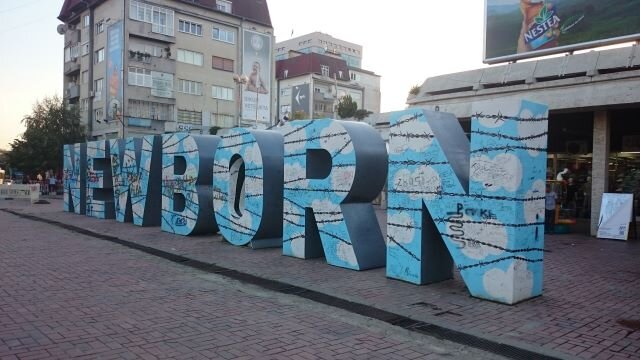
De facto states research unit
Genesis
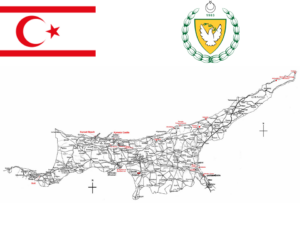 Founded in 1960, the Republic of Cyprus became a compromise solution between the rival powers of Turkey and Greece, and the ex-colonial power the UK, with the Constitution which factually ceased to exist in 1963. The Turkish Cypriots’ secessionist endeavours to establish, at first, a “federated state” (1975), and then subsequently an “independent republic” (1983) were aimed at paving the way for an equal standing vis-a-vis the Greek Cypriot administration. The Turkish Cypriots carefully formulated their declaration of independence in such a way that it would not preclude a solution to the “Cyprus problem” and their leadership remains officially committed to a bi-communal, bi-zonal Cyprus settlement. Today, tens of thousands of Turkish troops and a UN buffer zone have secured the territory claimed by the Turkish Republic of Northern Cyprus without solving the “Cyprus problem”.
Founded in 1960, the Republic of Cyprus became a compromise solution between the rival powers of Turkey and Greece, and the ex-colonial power the UK, with the Constitution which factually ceased to exist in 1963. The Turkish Cypriots’ secessionist endeavours to establish, at first, a “federated state” (1975), and then subsequently an “independent republic” (1983) were aimed at paving the way for an equal standing vis-a-vis the Greek Cypriot administration. The Turkish Cypriots carefully formulated their declaration of independence in such a way that it would not preclude a solution to the “Cyprus problem” and their leadership remains officially committed to a bi-communal, bi-zonal Cyprus settlement. Today, tens of thousands of Turkish troops and a UN buffer zone have secured the territory claimed by the Turkish Republic of Northern Cyprus without solving the “Cyprus problem”.
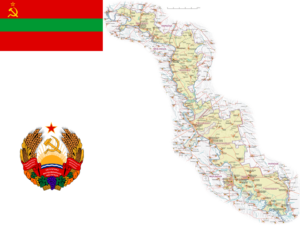 Reacting to Moldova’s declaration of independence, the Transnistrian Supreme Soviet voted to establish their own state as part of the Soviet Union on 2 September 1990. The area east of the Dniester River accounts for 12% of Moldovan territory and 17% of Moldova’s population, and has been effectively governed by the Transnistrian Moldovan Republic since 1992, when a cease fire agreement was signed, and the Russian military contingent re-established itself in a dubious peace-keeper/security provider role. Transnistrian secessionism has been confirmed by several subsequent referendums: 1991, 1995, and 2006. Although de facto state authorities have been heavily engaged with nation-building and state-formation practices during the last 30 years, the most preferred option includes free association with the Russian Federation.
Reacting to Moldova’s declaration of independence, the Transnistrian Supreme Soviet voted to establish their own state as part of the Soviet Union on 2 September 1990. The area east of the Dniester River accounts for 12% of Moldovan territory and 17% of Moldova’s population, and has been effectively governed by the Transnistrian Moldovan Republic since 1992, when a cease fire agreement was signed, and the Russian military contingent re-established itself in a dubious peace-keeper/security provider role. Transnistrian secessionism has been confirmed by several subsequent referendums: 1991, 1995, and 2006. Although de facto state authorities have been heavily engaged with nation-building and state-formation practices during the last 30 years, the most preferred option includes free association with the Russian Federation.
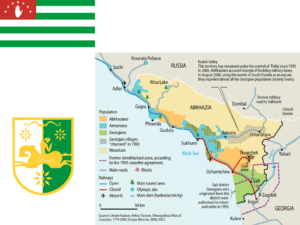 The Republic of Abkhazia declared its independence from Georgia in July, 1992, and has been a de facto independent state since 1993. As Abkhazia’s state-formation was carried out from the position of minority population, about 200,000-240,000 Georgians were expelled to shift the ethnic balance. After being recognized by Russia in 2008, it has been increasingly locked into cooperation agreements which allow Russia to exert more control over its everyday domestic affairs. Russian-Abkhazian relations reached a new level in November 2014, when the Treaty of Alliance and Strategic Partnership was signed. This latest Russian move was largely interpreted as an attempt to annex Abkhazia and dismember Georgia. Till today, its non-Georgian population is divided on whether its end goal should be independence or some form of association with the Russian Federation.
The Republic of Abkhazia declared its independence from Georgia in July, 1992, and has been a de facto independent state since 1993. As Abkhazia’s state-formation was carried out from the position of minority population, about 200,000-240,000 Georgians were expelled to shift the ethnic balance. After being recognized by Russia in 2008, it has been increasingly locked into cooperation agreements which allow Russia to exert more control over its everyday domestic affairs. Russian-Abkhazian relations reached a new level in November 2014, when the Treaty of Alliance and Strategic Partnership was signed. This latest Russian move was largely interpreted as an attempt to annex Abkhazia and dismember Georgia. Till today, its non-Georgian population is divided on whether its end goal should be independence or some form of association with the Russian Federation.
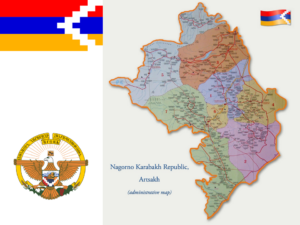 The Nagorno-Karabakh Republic (or the Republic of Artsakh) declared its independence from Azerbaijan in September 1991, consisting of the territory of the autonomous oblast (NKAO) and the Shahumyan district of Azerbaijan. During the following secessionist conflict, Karabakhi Armenians, with the support of Armenia proper and Armenian diaspora communities, were able to occupy 13.4% of internationally recognized Azerbaijani land– almost the entire territory of the former NKAO as well as seven adjacent Azerbaijani regions (Lachin, Kelbajar, Jabrayil, Gubadly and Zangilan and substantial parts of Agdam and Fizuli)– by the end of 1993. Although the ceasefire agreement was signed in 1994, the attempts to settle the conflict peacefully did not prove frutiful either. When it came to economy, culture and defense, Nagorno-Karabakh and Armenia could be seen as a single space. Yet, it remained insecure and entirely unrecognized with many of its residents favoring unification with Armenia over independence as their preferred end goal. Following the blockade on the Lachin Corridor and a military offensive by Azerbaijan in 2023, Nagorno-Karabakh was formally dissolved in 2024.
The Nagorno-Karabakh Republic (or the Republic of Artsakh) declared its independence from Azerbaijan in September 1991, consisting of the territory of the autonomous oblast (NKAO) and the Shahumyan district of Azerbaijan. During the following secessionist conflict, Karabakhi Armenians, with the support of Armenia proper and Armenian diaspora communities, were able to occupy 13.4% of internationally recognized Azerbaijani land– almost the entire territory of the former NKAO as well as seven adjacent Azerbaijani regions (Lachin, Kelbajar, Jabrayil, Gubadly and Zangilan and substantial parts of Agdam and Fizuli)– by the end of 1993. Although the ceasefire agreement was signed in 1994, the attempts to settle the conflict peacefully did not prove frutiful either. When it came to economy, culture and defense, Nagorno-Karabakh and Armenia could be seen as a single space. Yet, it remained insecure and entirely unrecognized with many of its residents favoring unification with Armenia over independence as their preferred end goal. Following the blockade on the Lachin Corridor and a military offensive by Azerbaijan in 2023, Nagorno-Karabakh was formally dissolved in 2024.
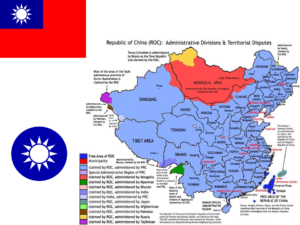 Unlike many similar units with only partial recognition, the Republic of China (or Taiwan) is not a secessionist entity that has proclaimed unilateral independence. Instead, it owns its contested statehood to regime change in Mainland China, which reduced the ROC to the ‘government-in-exile’ on the Taiwan island. Taipei considers ambiguously ‘one China’ to mean the Republic of China (ROC), founded in 1911 and with de iure sovereignty over all of China which temporarily holds jurisdiction only over Taiwan, Penghu, Kinmen and Matsu. Only since 1987 to the present day, Taiwan has been engaged in the construction of Taiwan as a sovereign state, thus gradually distancing from the ‘one China principle’. The international community treats the PRC as the ‘parent,’ and Taiwan as the putative offspring whose independence declaration could be interpreted as secession attempt from indivisible China.
Unlike many similar units with only partial recognition, the Republic of China (or Taiwan) is not a secessionist entity that has proclaimed unilateral independence. Instead, it owns its contested statehood to regime change in Mainland China, which reduced the ROC to the ‘government-in-exile’ on the Taiwan island. Taipei considers ambiguously ‘one China’ to mean the Republic of China (ROC), founded in 1911 and with de iure sovereignty over all of China which temporarily holds jurisdiction only over Taiwan, Penghu, Kinmen and Matsu. Only since 1987 to the present day, Taiwan has been engaged in the construction of Taiwan as a sovereign state, thus gradually distancing from the ‘one China principle’. The international community treats the PRC as the ‘parent,’ and Taiwan as the putative offspring whose independence declaration could be interpreted as secession attempt from indivisible China.
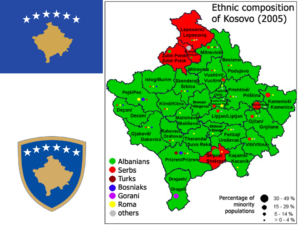 Kosovo first declared its independent statehood in 1992, and then in 2008 after failed negotiations over the status question. De facto, it has been out of Belgrade’s control since 1999, when the NATO air campaign against the Federal Republic of Yugoslavia brought an end to human suffering and ethnic cleansing in Kosovo and made it a subject of UN protection and administration. The western community has been deeply engaged in Kosovo’s post-conflict reconstruction works along the guidelines of liberal peace-building, and thus contributed to the state-formation. As of 13th November, 2019, the Republic of Kosovo has received 115 diplomatic recognitions as an independent state, of which 14 have since been withdrawn. It has not been recognised by Serbia, Russia, China, India, Indonesia, Brazil as well as five EU member states (Spain, Cyprus, Greece, Romania and Slovakia). Serb-populated enclaves across Kosovo as well as North Kosovo (in size of 1,200 km2 and comprising 11% of Kosovo’s territory) have parallel structures upheld by Belgrade.
Kosovo first declared its independent statehood in 1992, and then in 2008 after failed negotiations over the status question. De facto, it has been out of Belgrade’s control since 1999, when the NATO air campaign against the Federal Republic of Yugoslavia brought an end to human suffering and ethnic cleansing in Kosovo and made it a subject of UN protection and administration. The western community has been deeply engaged in Kosovo’s post-conflict reconstruction works along the guidelines of liberal peace-building, and thus contributed to the state-formation. As of 13th November, 2019, the Republic of Kosovo has received 115 diplomatic recognitions as an independent state, of which 14 have since been withdrawn. It has not been recognised by Serbia, Russia, China, India, Indonesia, Brazil as well as five EU member states (Spain, Cyprus, Greece, Romania and Slovakia). Serb-populated enclaves across Kosovo as well as North Kosovo (in size of 1,200 km2 and comprising 11% of Kosovo’s territory) have parallel structures upheld by Belgrade.
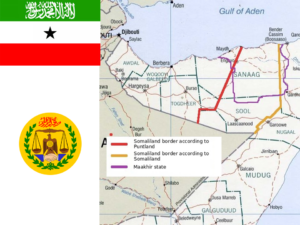 The Republic of Somaliland declared its independence from Somalia in May 1991 and has been de facto independent since then, although its control over the eastern part of its claimed territory is tenuous and contested. A former British colony, the combination of Somaliland’s separate colonial existence, its five days of sovereign independence, and its respect for former colonial borders gives it a unique degree of legitimacy in terms of the contemporary interpretation of self-determination that no other secessionist entity approaches. Yet, in spite of this and its generally impressive accomplishments in terms of democratization and maintaining peace, Somaliland remains entirely unrecognized. It is also unique among other cases, as it lacks the support of an external patron state. Somaliland remains committed to the goal of sovereign independence.
The Republic of Somaliland declared its independence from Somalia in May 1991 and has been de facto independent since then, although its control over the eastern part of its claimed territory is tenuous and contested. A former British colony, the combination of Somaliland’s separate colonial existence, its five days of sovereign independence, and its respect for former colonial borders gives it a unique degree of legitimacy in terms of the contemporary interpretation of self-determination that no other secessionist entity approaches. Yet, in spite of this and its generally impressive accomplishments in terms of democratization and maintaining peace, Somaliland remains entirely unrecognized. It is also unique among other cases, as it lacks the support of an external patron state. Somaliland remains committed to the goal of sovereign independence.


